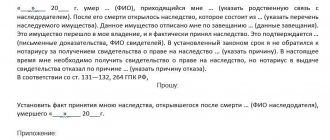Home » Inheritance » How to properly draw up and write a will
56
The provisions on the will are contained in the third chapter of the Civil Code of the Russian Federation. According to it, every citizen has the right to dispose of personal property at his own discretion: to appoint some as heirs and deprive others of this right, or to distribute inheritance rights among legitimate claimants in the desired manner.
It is important to remember that making a will is your only opportunity to name your successors after death and is potentially a defining moment in the lives of your loved ones. Therefore, it is necessary to treat this with great responsibility, without ignoring the established procedure and form of writing the last expression of will.
How to draw up a will so that it is not contested
According to Art. 1131 of the Civil Code, interested parties can challenge the will or part of it in court, but this can only be done if there is evidence of the invalidity of the act. In practice, this happens in the following cases:
- The testator drew up the act under the suppression of threats and physical violence towards himself and his loved ones.
- Witnesses when signing a document were persons who did not have the right to do so - a notary, interested parties (heirs and legatees under a will, their close relatives), citizens who were not fully capable, persons who were not aware of what was happening, witnesses who did not understand the meaning of what was written (with the exception of signing a closed form of the act).
- The orders were made by a person aged 14 to 18 years without the knowledge or consent of parents, guardians or adoptive parents (the restriction does not apply to fully capable minors).
- When writing the act, the testator was recognized as fully or partially incompetent.
- The object of the will was property, the management and disposal of which is limited or prohibited.
- The testator did not account for his actions or was under the influence of a significant mistake.
If the will is written, signed and certified properly, in full compliance with the prescribed requirements, then it will be impossible to challenge it.
When drawing up a valid act of expression of will, you should also make sure that it:
- certified by an authorized body;
- corresponds to the established pattern;
- contains the date of certification;
- signed by the testator and, if the situation so requires, by witnesses;
- does not contain contradictory orders.
To eliminate the possibility of challenging the document due to his alleged insanity or incapacity, the testator can provide the notary with a certificate or medical report reliably stating the opposite.
Registration of deed of gift
The fact of transfer of property as a gift is formalized by a civil gift agreement. In this case, the recipient can be either a relative of the donor or any other individual or legal entity. When drawing up a contract, two conditions must be met:
- the subject of the donation (apartment, house, land plot) must be fully described indicating all the data - all characteristics, address, area, etc., with an extract from the Unified State Register attached;
- The gift agreement is unconditional, that is, it should not contain limiting conditions - for example, the recipient’s reaching a certain age, the fact of his marriage, the appearance of children, etc.
Important! Keep in mind that the popular formulation when donating apartments “with the right of lifelong residence” is not specified in the law and has no legal force. If the recipient subsequently wants to violate the set condition, it will be difficult to protest his actions.
The deed of gift does not require notarization, so you can save on such services. However, qualified lawyers still recommend sparing no expense and additionally visiting a notary. In the future, this may save you from problems if you need to confirm the donor’s legal capacity in court if there are other claimants to his property.
List of documents that will be required to prepare a deed of gift for real estate for registration in Rosreestr:
- application for state registration and change of property owner;
- receipt (cheque, payment order) for payment of the duty;
- documents proving the identity of the donor and the recipient;
- real estate documents - cadastral passport, USRN certificate ;
- certificate of the value of the object, certified by the BTI;
- if an apartment or house is donated - a certificate of registered persons.
Important! If minor children are registered in the house or apartment, permission from the guardianship authorities will be required to conclude a gift agreement.
Depending on local government requirements and the type of property being donated, additional information may be required from the owner. The exact list of required documents will have to be clarified on the Rosreestr website or at MFC branches.
Important! The law requires written, notarized consent to the transaction from the spouse of the donor if the property was acquired during a legal marriage. If the property was purchased during the premarital period, the consent of the second spouse does not need to be obtained.
Who can be a testator
A will is a unilateral transaction, which by law can only be made:
- the owner of the transferred object (the right must be officially registered at the time of the death of the testator);
- an absolutely sane and adequately thinking person, without signs of mental disorder or drug/alcohol intoxication;
- a fully capable citizen - over 18 years of age, mentally healthy, emancipated (over 16 years of age, working under a contract or engaged in entrepreneurial activity, recognized as such by the guardianship and trusteeship body or the court);
- a minor testator over 14 years of age with the consent of parents/guardians/adoptive parents;
- a citizen with limited legal capacity with the consent of the trustee.
Who can be named as an heir?
The law gives almost complete freedom of action to the testator. He can assign his property to relatives, third parties, an enterprise or the state (Article 1119 of the Civil Code of the Russian Federation).
The will can specify 1 or more claimants to the testator's assets. Additionally, it is possible to display the size of the share of each of them.
The testator may not indicate heirs, but transfer his property to the inheritance fund for subsequent disposal at his request. The foundation is registered by a notary after the opening of the inheritance. The share of property determined by the testator is transferred to the foundation.
Thus, a citizen can provide for the disposal of his property:
- monthly payments to relatives;
- investments in shares and other securities;
- charitable payments;
- other actions at the discretion of the owner.
The only limitation is that the testator cannot deprive socially vulnerable citizens of a share of the inheritance.
The rule on compulsory share of inheritance applies to the following citizens:
- minor children;
- disabled children, parents, spouse;
- disabled dependents of a deceased citizen.
If at the time of the owner’s death such a person is identified, he is entitled to at least half of the share that relatives inherit within the framework of the law (Article 1149 of the Civil Code of the Russian Federation).
Important! Deprivation of these citizens of a share of property may become grounds for declaring the order invalid.
The obligatory heir must choose between payments from the inheritance fund and the obligatory share. However, the share cannot exceed the amount for the maintenance of a citizen in order to maintain the standard of living that was available to him during the life of the testator.
Where to go
As noted above, inheritance orders acquire legal force only after certification by an authorized body, which in most cases is a notary. He not only certifies the document, but also keeps one of its copies in his possession until the opening of the inheritance. And from July 1, 2014, it also enters its data into a unified register, making it easier for relatives who are unaware of its whereabouts to find the act.
Access to the unified database of valid wills is closed to everyone except working notaries, who, in accordance with Art. 1123 of the Civil Code are obliged to keep secret information known to them from the document.
But, as Art. 1127 of the Civil Code, certification of the last orders of the testator is possible without a notary, but only under special circumstances, when the testator is in:
- a home for the elderly, disabled, hospital or other medical facility;
- long-distance navigation on a ship flying the Russian flag;
- expeditions;
- a military unit near which there is no active notary;
- places of detention.
In these cases, the authority to certify a will is acquired by chiefs, directors of institutions, chief or duty doctors of hospitals, captains of ships and commanders of military units.
Citizens of the Russian Federation who are abroad have the right to apply to an official of the consular office of the Russian Federation for certification of their posthumous property dispositions.
What to bequeath
The testator has the right to bequeath all of his property, including those acquired in the future, or only part of it. He can also distribute the inheritance among successors in any shares and in any order, based solely on personal considerations.
The inheritance can be:
- movable and immovable property;
- land plot;
- stock;
- bank deposits;
- valuables;
- sums of money not paid to the testator during his lifetime;
- enterprise or farm.
Separately, the purpose of testamentary refusal and assignment should be mentioned. In accordance with Articles 1137 and 1139 of the Civil Code, the testator has the opportunity to order that specified persons receive certain material benefits and services from the testator.
The subject of a testamentary refusal is property obligations carried out at the expense of the received inheritance:
- provision of the specified thing for use;
- periodic payment of established amounts of money;
- performing specific work;
- transfer of ownership of one or more objects of inheritance;
- acquisition of certain property for the legatee.
A testamentary assignment may be assigned to the implementation of some generally useful purpose, not necessarily of a property nature, for example, caring for a pet.
The testator has the right to order the appointment of an executor of the will, assigning to him the responsibilities of transferring property to the heirs and monitoring the implementation of the testamentary refusal or assignment.
Types of wills
The law provides for several types of wills. Their legal force is not always equivalent, but each of them is adapted to certain circumstances and can be chosen by the testator at will, albeit with some reservations.
Open notarized
It can also be called universal and the definition of openness here is relative. The document is available for reading by the notary, witnesses and executor, but no more, if such is the desire of the testator. All participants in the process of certification of the act are required to keep its contents secret. Otherwise, they may be required to pay monetary compensation for moral damage caused in this way.
Such a will, if the mandatory requirements for its preparation are met, is a reliable way to dispose of property in the event of death. Its legal significance is guaranteed by Articles 62 of Chapter 62 of the Civil Code of the Russian Federation and can be challenged in exceptional cases.
Using an open notarized document, you can bequeath property of all types (except those prohibited by law) if you have access to any valid notary in the country or the persons indicated in the last paragraph of the “Where to contact” block.
Closed
This is a type of act of expression of will described above, with the only difference being the nuances of execution and the complete confidentiality of the information contained in it.
If the testator wishes to hide his posthumous dispositions from others until the opening of the inheritance and has doubts about the secrecy of the will by the notary and other participants in the execution, he should draw up a document in a closed form.
If the procedure for making a closed will is strictly followed, the testator’s orders will be learned only after his death. The document itself, hidden in two sealed envelopes, is kept by the notary who compiled it. The testator does not have his own copy - after the registration procedure, he is given only a document confirming the action performed.
Testamentary disposition
This type of act of expression of will has the same force as a will only in relation to bank deposits. No other property can be transferred with its help.
The rules for drawing up a testamentary disposition are similar to a standard will, but are made according to a simplified scheme and without the presence of a notary. The necessary actions for certification and registration of the document are carried out by an authorized bank employee.
By means of a testamentary disposition, the owner of a cash deposit can appoint one or several heirs and assign others to them (in case the priority successors do not accept the inheritance). The object of succession for them can be all the testator’s cash accounts in a particular bank, one or more of them, or part of one deposit. In this case, the testator has the right to set conditions for the heir to receive money, for example, that he reaches a certain age, etc.
In emergency situations
In conditions that threaten the life of the testator, he has the right to express his last will in simple written form, without certification by a notary or other authorized persons. But certain requirements for drawing up and entering into inheritance under such a will still exist:
- The testator must personally state and sign the deed. The signature of the executor or the writing of instructions by other persons from the words of the testator (as in the case of notarial registration) is not allowed.
- The expression of will must take place in the presence of at least two witnesses who, if necessary, will hand over the paper to the heirs and confirm the authenticity of the will and the fact of an emergency.
- The will expressed by a citizen in emergency circumstances is recognized only in the event of his death within a month after the making of the will. After this period, the document is canceled, but its essence can be secured through a notarized deed.
- Heirs can enter into an inheritance under a will written in emergency circumstances only through the court, after its legality has been established.
How to correctly draw up a will during your lifetime (sample)
Before you start drawing up your last statement of will, you need to familiarize yourself with the rules of writing:
- The will must be made by an individual. If the testator, for good reasons, is not able to display the contents of the act on his own, a notary does this from his words, after which he must pass it on to the testator for reading or read it himself (also for good reasons).
- The signature of the will-maker is an integral part of the legal force of the document. If the testator is unable to do this, another citizen signs the act for him, but in the presence of an authorized body.
- The deviations from the rules described above must be noted by the notary on the will, indicating the reasons that led to them.
- It is important to note the date and place where the will was made - without this, the document becomes invalid (does not apply to a closed will).
- When drawing up a closed will or writing a declaration of will in emergency circumstances, the presence of two witnesses is required.
- A will not certified by a notary must contain the signature of one witness.
- It is mandatory to indicate the names and contact information of witnesses or the person who signed the document instead of the testator, on the will itself or on the envelope with it.
Procedure for compilation
When making a will at a notary, the contents of the act are written by hand or using technical means (typed on a computer and printed) personally by the testator or from his words. Then the document form is certified by the authorized body and, if necessary, signed by witnesses. Standard execution requires drawing up a will in two copies, one of which is given to the testator, and the other remains with the notary.
If the will was made in closed form, all the necessary signatures, seals and notes are placed on the envelope in which the written instructions of the testator are sealed. The envelope remains with the notary until the inheritance is opened, and the testator is given a paper confirming the acceptance of the closed document.
In Art. 1129 of the Civil Code of the Russian Federation prescribes the procedure for presenting the testator’s orders in emergency circumstances. The process involves the transfer of one's will in a simple form, but with the obligatory presence of two witnesses who signed the paper along with the testator. Such a document will have incomplete legal force, and you can only receive an inheritance through it through the court.
Open form of testamentary act
Russian legislation provides for several types of administrative documents on the fate of the testator’s belongings. In terms of their legal force, they are not always equivalent. However, each of them is adapted to specific circumstances and can be chosen by the testator at will, with certain reservations.
An open will is also called a universal will.
The term openness in this case is considered relative. Such a will is available for review by witnesses, a notary, and executors. Other persons do not have the right to read the will if such an intention was expressed by the testator. Each participant in the document certification procedure must keep secret what is contained in it. Otherwise, they may be required to pay monetary compensation for moral damage caused.
Article 62 of the Civil Code acts as a guarantee of the legal significance of an open form. This provision can only be challenged in exceptional cases. Thanks to such a document, executed by a notary, it is possible to bequeath property of any type (except for those prohibited by law).
Closed form of will
A closed will is a similar type of act of will, but the difference lies only in the design features and the absolute confidentiality of the information contained in the document.
When the testator wants to hide his own orders from other persons before the inheritance opens, he needs to draw up a will in closed form. Also, this form of testamentary document is used if he has doubts about the observance of testamentary secrecy on the part of the notary and other participants in this process.
What must be specified in a will
The act of expression of will, regardless of the form of preparation, must contain the following information:
- place and date of commission;
- last name, first name, patronymic, address of the registered place of residence of the testator;
- surname, name, patronymic, address of the appointed heirs (except for cases when the heir has not yet been born);
- specific property orders of the owner.
It is not necessary to indicate the composition and characteristics of the bequeathed property. Any property can be included in the estate, including property that was not part of the testator’s personal assets at the time the will was executed. In order to dispose of it in advance, the testator can establish the transfer of all his property, wherever it is located and whatever its contents.
The size and content of the inherited shares (if there are several appointed heirs) are also not mandatory information when drawing up a will. The will of the testator may consist in something else, for example, only in depriving a certain successor of the inheritance by law, assigning a testamentary refusal, assignment, or simply indicating the heirs.
If the size of the shares of the estate is not specified by the testator, it is divided among the appointed successors in equal shares.
What documents are needed
To draw up a will, you must prepare the following papers and information:
- Civil passport of the testator.
- List of heirs and copies of their documents . Additionally, it is necessary to indicate the residential addresses and dates of birth of legal successors. If a citizen wanted to nominate an heir in the event of the death of the applicant, then his data will also be required.
- List of property to be released . Not only a list of assets, but also the shares of each heir can be indicated here. If the testator does not indicate specific shares, then the inheritance is distributed in equal parts among the claimants.
- Certificate of absence of mental illness . If a citizen has reached the age of 70 , then it is advisable to prepare a certificate from a medical institution confirming the absence of mental illness. It can be taken from a psychiatrist at your place of residence. The certificate will be additional confirmation that the person is aware and aware of the consequences of his actions. The absence of such a document may lead to a will being contested. Today, there are often cases where an administrative document is declared invalid due to the fact that the person did not realize the significance of his actions or could not control them.
- Additional papers . The list is not final. For example, if a foreign citizen contacts a notary office, you will need a foreign passport and its translation into Russian.
- Civil passports of witnesses . If witnesses will be involved in the registration of the inheritance, their passports will also be required.
How many copies is a will written in?
The required number of copies depends on the type of will:
- an open, notarized deed and a testamentary disposition in a bank are drawn up in two copies, one of which remains in the custody of a notary or in a bank branch, and the other is transferred to the testator;
- a closed will is a single document, sealed in two envelopes and stored with the notary who certified it, but the testator is given only a paper confirming the acceptance of the act;
- a citizen's testamentary dispositions, drawn up in simple written form, do not imply duplication, since a simplified procedure is provided for their presentation due to the presence of emergency circumstances.
Registration fee
By law, the execution of a will provides for only one item of expense - payment of a fee for the implementation of notary services. Citizens making a testamentary disposition in a financial institution or expressing their last will under life-threatening circumstances are not affected by this obligation.
And for certification of inheritance transactions of open or closed form, the compiler will have to pay the amount established by clause 13 of Art. 333.24. Tax Code of the Russian Federation, in the amount of 100 rubles.
How to correctly write a will for an apartment (sample)
To draw up a will for an apartment, you must correctly indicate its address; otherwise, the contents of the act do not differ much from the general form of the document. An example of it can be seen below.
Change and cancellation
The testator has the right to change the expression of will or completely cancel it. You can do this in two ways:
- By drawing up a separate order to cancel the entire act or its individual paragraphs.
- By writing a new will, when the provisions established in it contradict the previous ones and thereby revoke them.
A will can be adjusted and drawn up an unlimited number of times without specifying the reasons for this, without expecting consent from the heirs determined by the previous act.
It is important to remember that a new act of property disposition cancels the previous one only on the relevant points. The part of the previous will that is not affected by a separate revocation or contrary instructions will remain in force.
A testamentary disposition in a bank is canceled according to a similar principle, however, an application for this can be submitted both to the financial institution itself and to a notary. In the latter case, information about the cancellation must be transmitted to the relevant bank branch.
To cancel a document drawn up under life-threatening circumstances of the testator, nothing needs to be done. Its legal significance will be canceled automatically after 30 days from the date of writing, but only if the author of the act remains alive longer than this period.
Why is it important to find a will after the death of the testator?
According to current legislative norms, operations with inheritance are carried out six months after the death of a citizen.
If one or more heirs renounce their share, this point must be recorded by a notary. If the agreed period is missed, the heirs will have to go to court. It is logical to start the search for a will with the living space where the deceased recently lived. To understand where a document is stored, you need to know his habits and lifestyle well, otherwise it will be difficult to find the papers.
It is good if peace and harmony reign among the heirs, and the discovered will does not contradict their expectations. But sometimes it happens that the deceased signs off his property not to relatives, but to strangers. In this case, relatives may in every possible way prevent the publication of the document. There is a reason for this: if you do not declare your rights in time, the property goes to those who are the heir by law. And challenging a will after other people have inherited is quite difficult.
Is an oral will allowed?
Civil law strictly regulates the form and rules for drawing up a will. And according to Art. 1124 of the Civil Code of the Russian Federation, it must be done exclusively in writing.
If the testator is unable to express his will in person (due to illiteracy, health or physical disabilities), he can ask a notary to do so.
And the signing of the document instead, if necessary, is carried out by a signatory - a disinterested person specially invited for this purpose, whose passport and contact information are also indicated on the will.
Mandatory conditions for the execution of the will of the deceased
When making a will, it is important to remember that it will only be valid if the following conditions are met:
- the document is in written form - the use of oral or electronic format is not acceptable;
- the will bears the signature of the deceased;
- the legal capacity of the testator at the time of drawing up;
- certification of the document by a notary - without contacting such an office, the paper will not have any force; moreover, the will must be entered into a special register.
In some cases, even when these conditions are met, the legal heirs try to challenge the will. Their main argument is the incapacity of the deceased relative. To protect the future heir, before contacting a notary, you should obtain a certificate from a psychotherapist or a doctor’s report on your full legal capacity.
How many wills can a citizen make?
The possible number of wills from one citizen is not limited by law. He has the right to compose as many of them as he wishes. At the same time, as noted above, a new expression of will, contradicting the meaning of the previous one, cancels it. If they contain orders of a different nature or relate to different property, each will will have equal legal force.
The testator, as a rule, is prompted to write a will by concern for the fate of loved ones and the desire to distribute his property in the most rational way, and the legislation of the Russian Federation provides this opportunity to every capable citizen. But in practice, it is not always clear how to implement it correctly: a seemingly insignificant inaccuracy or understatement can cause a misinterpretation of the act or its invalidity.
The lawyers of the ros-nasledstvo.ru portal will help to eliminate the occurrence of misunderstandings and gross errors in drawing up such an important document as a will. Ask them your question via the electronic form and get your first free consultation in just 5 minutes.
FREE CONSULTATIONS are available for you! If you want to solve exactly your problem, then
:
- describe your situation to a lawyer in an online chat;
- write a question in the form below;
- call Moscow and Moscow region
- call St. Petersburg and region
Save or share the link on social networks
(
2 ratings, average: 4.00 out of 5)
- FREE for a lawyer!
Write your question, our lawyer will prepare an answer for FREE and call you back in 5 minutes.
By submitting data you agree to the Consent to PD processing, PD Processing Policy and User Agreement
Useful information on the topic
2
How to restore a death certificate
A death certificate is one of the first documents required by a notary...
4
The moment of accepting the inheritance
The moment of taking possession of hereditary property is a controversial concept and...
10
Mandatory spousal share in inheritance
The spouse is the primary legal successor and, under certain conditions, the legal owner...
42
Registration of a car by inheritance after the death of the owner
A car is also property subject to inheritance. As in…
6
What to do next after inheriting
The responsible process of registering an inheritance is left behind, and the successors are already ready...
3
Is inheritance considered joint property?
In modern realities, an inheritance received is the main opportunity for a valuable acquisition...







